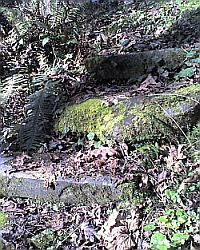| BLACKBOARD V | |||||||||||||||||||||||||||||
|
I just remembered this--October 23, 2013:
*****************************
***************************** October 10, 2012I was watching a documentary on the Earth, specifically its geology, and when they were dealing with mid-ocean hydrothermal vents belching new earth, it struck me. Not too long before, I watched a program on Cosmology. So, two ideas merged, or, at least, seemed to.
The image to the right is a computer-generated picture of the cosmos, the filaments are where galaxies and clusters reside, the vast emptiness separating them is space itself. That's what's expanding, spreading, and by so doing, increasing the distance between filaments. Now, let's impose this picture of cosmic dynamism onto that of Earth-bound tectonics. Suppose that as new earth is created along the ocean ridges, the planet expands, the area welling up from the rifts and deep-water trenches increasing as it collides with adjacent crust. This happens because gravity and anti-gravity are fused as one supergravity that allows the planet to grow, its diameter gradually increasing, its mass thinning. Eventually, all internal material would be used up, which means no more magnetic field, a force that was exponentially decreasing as the Earth expanded. Gravity has lost the absolute minimum of what it needs to draw adjacent matter to it. The Earth, nothing but surface now, a mere shell of its former greatness, suddenly dissolves into the surrounding vacuum. There may very well be other universes where that is exactly what happens. When mass is below some threshold, gravity dominates, suns are formed in the usual way we know. But after a critical value, anti-gravity kicks in or is turned on and increases geometrically with decreasing mass. Thus, gravity and dark energy may be two halves of one primordially existing whole; once upon a time, they separated or one precipitated out, like the electroweak force union of electromagnetism and the weak nuclear force. And suppose that the filaments where clusters of galaxies group together are analogous to these earth-oozing vents and are themselves vents oozing space as a real thing, and thanks to dark energy--anti-gravity--forever expanding the void of quantum-fluctuating emptiness. That's the main difference in our hypothetical model--dark energy. The Earth is constrained, space is not. So, what is it, this mysterious elastic force of nature? We represent four to five percent of what constitutes the universe--visible matter. Perhaps there's something about it that precludes mingling with dark energy, like water and oil. Absolute space, on the other hand, harbors no such reservations. Somehow, dark energy is intimately infused into the nature of space, whereas it isn't with matter. When space is created tectonically, does it impinge on adjacent tendrils of galaxies, and, in the process, push these tendrils away to occupy the infinite emptiness available? The sky's the limit! And, besides this pushing action, does space subduct under these galaxy-filaments of both visible and dark matter, and, thereby, supply matter with the energy necessary to generate new stars?
In any given galaxy, the space between stars--the interstellar medium--doesn't expand because each galaxy is enclosed by a sphere, egg-like, of dark matter, insulating it from the dark energy of the empty space between galaxies. Otherwise, as time went on, individual stars would expand away from one another, speading a galaxy apart. When astronomers say that a particular supernova in a distant galaxy happened 10 billion years ago and we're just seeing the result of that explosion now, they have to take into account how much space has spread since this event in order to determine how far away it was when it went off. Ten billion light years away then or now? Absolute space may very well behave quasi-tectonically, I don't know. But, it doesn't hurt to look at things in different ways.
***************************** 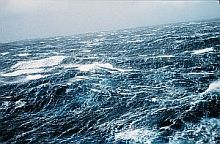 Storms At Sea
Storms At SeaHow often does someone get the opportunity to be awed by nature, overwhelmed by its sheer force, at its mercy, in person, and survive to talk about it? It deepens one's sense of proportion and alters perspective. Humility learned, yet unafraid to face it again and again. It's very liberating, no pretenses or act of will can contain the larger self of which we are active participants only. Like flotsam cast about by the sea's vagaries, we can only hold on and hope and not give up. And if lucky, a safe haven will be found, the storm will abate. And after repairs are made, we once again set out to sea. We cannot help it, it's in our blood.
***************************** Andrea Ghez and Reinhard GenzelAndrea Ghez and Reinhard Genzel shared the 2012 Crafoord Prize, awarded by the Royal Swedish Academy of Sciences, for their determination that a supermassive black hole lies at the center of our galaxy, the Milky Way. It's believed that this is the case for all galaxies. It got me to thinking. A central black hole is considered a thing in itself, cut off from the rest of a galaxy at the event horizon; its effects, however, reaching well beyond, drawing stars and other material into its maw. But we also have dark matter suffused throughout the galaxy to beyond its periphery, without which a spiral galaxy, like ours, would fly apart. Suppose the two were connected. I mean, what if the central black hole and dark matter were one something which existed prior to visible matter and subsequent stars, orchestrating and organizing a galaxy? What's the difference between black and dark? And, is it possible that all black hole/dark matter constructs throughout the universe are interconnected like the filaments of fungi through the substrate of a forest? Underpinning, like scaffolding, all that we see? And black holes as the result of supernovae dotting the interior of a galaxy were nodes of that network, the consequence of evolution, increasing complexity and strengthening the overall gravitational field? What if? Visible matter is totally dependent on dark matter. For the briefest period of how we measure time, in the beginning, there was only the dark form of matter. Evolution was the driving force. A mutation occurred, here, there, spotty at first. Dark matter transformed internally, grew in complexity, and became susceptible to the electromagetic force that suffuses all space. Hence, visible matter, of which we are composed, is the derivative of will and the need for the self-organizing universe to know itself. Visible matter is the consciousness emergent from the unconscious of dark matter.
*****************************
***************************** Science Report - November, 2126Doctor Leonardo McEisenstein and his team at the Appaloosa Academy of Sciences in Hungdung, China--Advanced Exploratory Division--have recently discovered that when the entire set of universes composing the local block are stacked on top of one another, for any parallel event and property under observation, the varying quantum series of probabilities 'fill in,' creating a continuum of infinite detail--fractally receding beyond the reach of present instrumentation--as well as an emergent configuration not otherwise apparent. This latter phenomenon has yet to be investigated; it may hold the key to understanding how blocks of universe-sheaves join and work together. Parallel Universe Theory has been around since the late 21st century, but once Doctor McEisenstein's group had ascertained the generating function defining discrete distances separating adjacent universes, the frequency operator revealed, through the universe-frequency wave equation--the McEisenstein Equation of Isomorphic Membrane Mechanics--the precise characteristics of each quantumly varying membrane-universe by projecting it physically 'into' our space, its manifestation nonlinearly apprehended, its specific laws and constants translated conformally. "There is yet much to learn," Doctor McEisenstein said at the awards ceremony, "we have only seen the frontier; now we have to discover what lies therein, what it all means, and,..., ponder the incredible vastness of the Hyperverse. We live on but a single membrane of a local block among countless billions, and for each block, the universes exist independently alongside each other and pass through one another unnoticed, while yet embedded one within the other. How can that be?" At that point, his eyes welled up and a glassy look came over him; he was led away by two of his team.
***************************** A Day In The Life Of...It was spring, the field mice had overrun his small, hole-riddled trailer set in the dense woods near a narrow, shallow, yet fast-moving river. He had been kept awake all night long by the sounds of their foraging, sitting up to shine his flashlight in the general vicinity of a disturbance whenever it got too annoying, then screaming at the offender to scare it out, a temporary cessation, very temporary. So, he laid in his bunk, just waiting for the next mouse scratching and shuffling amidst an otherwise still and quiet night, the faint rushing sound of the river in the background.
He had long since stopped trying to direct his thoughts in any kind of meaningful way. Memories and images welled-up unbidden; he treated them with indifference as though they were someone else's for whom he didn't care. He sat this way for most of the morning, nobody came, there were no sounds except for an occasional bird and, of course, the river. He wished he was part of the river, he wished he could just walk into it and become one with it, going wherever it went, cascading over rocks, slipping quickly past the banks, onward to the sea. He roused himself to walk down that way and stood on the bank watching its swiftness and certainty, it decisiveness. The river harbored no doubts about itself, it knew what it was and reveled in it; it had power and purpose and meaning.
Suddenly, a gust of wind from downriver ruffled the thick brush along the banks; the towering fir, cedar, and maple began to sway, causing him to look up. A solitary twig broke loose, falling silently to the forest floor, one among many already there, lost in the confusion. Then, as quickly as the wind had arrived, it too passed and all grew still again. The self-contained bubble of air seemed also to have purpose, to be on a mission of its own, traveling fast with no time to dawdle. He walked back up the hill to return to his chair in the secluded clearing in front of the trailer; he poured himself yet another cup of coffee, now lukewarm. He sat very still, the sun coursed the blue sky, the butterflies and birds continued about their business; nobody came to visit, he didn't care. A mysterious peace filled him, he was no longer anxious and unnerved, no longer worried and uncertain. He sat in the sun sipping coffee listening to the river as the Earth slowly turned under him.
***************************** The Quantum Nature of the Social-Security-Check Payment ScheduleI have a friend who receives his social security check on the fourth wednesday of every month. So, based on the concept of one month, he thought that each check was four weeks apart, regardless of dates. A month is a month. Given the randomness--periodicity over long periods of years notwithstanding [400 years]--of what day of the week might be what date of the month, I did a cursory glance at the math and accepted it, although it didn't feel right, those straggling days at the end must count for something. This month--November--he has to wait 5 weeks between checks. So, my intuition told me the waiting time varied between 4 and 5 weeks. But, I can't let stuff like that hang in mid-air, so when I got home, I took pen and legal pad and did the math, got my head around it. And what I discovered was that my intuition was wrong. Now, this may be common knowledge, I don't know, but the waiting time between checks is either exactly four seven-day weeks or exactly five seven-day weeks, the minimum and the maximum. No four weeks plus so many days. Here's the skinnies: The date of the first occurrence of any day of the week, let's take wednesday, to be specific, varies from the first to the seventh. And, the fourth wednesday of every month falls between the 22nd and the 28th inclusive. Those are the arithmetic constraints. Given a month of 31 days, if wednesday falls on the first--its fist occurrence--and we add 21 days--three weeks--it will put the fourth occurrence of wednesday on the 22nd of that month. Now, if wednesday falls on the first, that means--for a 31-day month--that the fourth wednesday of the previous month fell on the 25th [25 + 7 = 32, the first of the next month]. So, waiting 22 days in this month plus six in the previous gives us 28 days or four seven-day weeks. This is true for dates 25 to 28 inclusive. Pick another one--the 27th. The next occurrence of wednesday will be on the 34th, or the 3rd of the next month [x-date modulo 31]. Add 21 days [three weeks to get to the fourth wednesday], and you get the 24th. The previous month had four days left--28 to 31 inclusive--plus 24 yields a 28-day [four seven-day weeks] waiting time. This is true when the first occurrence varies from the first to the fourth inclusive. Take the fourth, we add 21 days to have the fourth wednesday on the 25th. But for the first occurrence to be on the fourth means that the previous month's fourth occurrence of wednesday was on the 28th [28 + 7 = 35 or the 4th], leaving three days [29, 30, 31] of a 31-day month [25 + 3 =28]. Okay. But now look at when the first occurrence is the 5th, 6th, or 7th. If it's on the 5th, the fourth wednesday is 21 days later on the 26th. The first occurrence on the fifth puts the previous month's fourth wednesday on the 22nd because the next wednesday falls on the 29th, and, 29 + 7 = 36, the fifth. Adding the 30th and 31st gives us nine days remaining in the previous month after the last check. So, 26 days plus 9 equals 35 days [26 + 9 =35], or five seven-day weeks. This is true for all three. If it falls on the 7th, it means the previous fourth wednesday was on the 24th [24 + 7 =31]. Seven plus 21 equals 28, and to that add a full seven days waiting time in the former month and we get 35 days or five full weeks. Nothing in between as I had intuitively misconstrued, no partial weeks, the math don't lie; it is not a continuum. It's deceptive, the idea of a regular event like 'the fourth wednesday of every month' [or of any day, of course] being separated by four weeks sounds rational, almost mathematical. My intuition suspected a varying number between four and five weeks. But to find out that it's either exactly four weeks or exactly five weeks surprised me. Did someone at the SSA figure that out or did they just decide on it for bureaucratic reasons unknown and it just happened to turn out that way? Are there more four-week waiting periods than five? Do they average out over time? In summation: if a check comes on the 22nd, 23rd, or 24th (of a 31-day month), you have exactly five weeks to wait for the next one. If it occurs on the 25th through 28th inclusive, you have exactly four weeks to wait. For a 30-day month, the 24th moves into the four-week waiting set [24 + 7 = 31 or the first of the next month]. Add 21 and the fourth occurrence falls on the 22nd to which we add 6 days from the previous month [22 + 6 = 28]. We used for our example 'the fourth wednesday of the month.' But the arithmetic works for any week, any day, and in either direction. Going forward, for a 31-day month, if the first occurrence of the day a person receives his check falls on the 1st through 3rd inclusive, he has to wait five weeks for his next one. And if it falls on the 4th through 7th inclusive, he has to wait four weeks. For a 30-day month, similarly, if the first occurrence of your day falls on the 3rd, your wait moves into the four-week period. In other words, if a person receives his check on the 3rd, the 10th, the 17th, or the 24th, he has to wait five full weeks for the next one unless the current month has 30 days. In which case, the interval of waiting is four weeks. As far as February goes, if it only has 28 days, regardless of what day or week you receive your check, you only have to wait four weeks for the next one. There's one exception: if you get paid on the same day as the first of the month in a February of 29 days, you have to wait five weeks for your next check. It seems I overcomplicated this whole thing, but, that's the inductive method in action. Stating the rule: If, in the first week of any month, the date of your day to receive a social security check, plus 28, is less than or equal to the number of days in that month [31, 30, 29, 28], then the time interval to your next month's check will be exactly five weeks. If the sum is greater than the number of days in that month, then next month's check will be exactly four weeks away. There, coherence and relative simplicity.
*****************************
***************************** Decmber 30, 2012I was just listening to Talking Head's Burning Down The House and it brought back old memories.
Early summer of 1988 Those were the days, my friend; those were the days. Good times.
***************************** January, 2013Speaker of the House, Republican John Boehner's scheduled colonoscopy had to be postponed when it was discovered that his head was in the way. No one who knows him was surprised.
During an interview with CNN, the leader of the NRA explained that the thousands of urban dwellers who own assault weapons need them to hunt "coyotes and other varmits." The interviewers let that pass without questioning its likelihood, nodding knowingly. Apparently, encounters with packs of coyotes in New York city are more of a problem than I thought. The interview ended on a jovial note; could be CNN is as much in the pocket of the NRA as is the Republican Congress. Although, it's sad to say, many Democrats have received substantial donations from the second-amendment group as well. It was the schoolyard all over again. For all the intelligence and interviewing skills Wulf Blitzer brings to the table, he's still a nerdy punk confronted by the Grand Wizard of the NRA, an arrogant bully. If, instead of Mister Blitzer, the interview had been conducted by a BBC reporter, I think Keene would have been shown for the pompous, pretentious, petty, ignorant jerk-off that he is. I grew up in Philly, but I've spent more than half my life living in the country, rural Alaska for 13 years and most of the rest in Western Washington. And, I've known hunters, especially in Cordova. They hunted, not for sport but for subsistence, for them and their families, to help get through the long winters. None of them would even think to go hunting with an assault rifle. I remember, many years ago, hearing about some cheechako killing a deer with an automatic, banana-clip 22. He completely destroyed the meat, not much was left to eat. Moreover, I've never known or heard of anyone who hunted for "coyotes and other varmits" with any kind of rifle. Now, ranchers hunt animals they consider 'varmits,' like wolves, who prey on their livestock, or might prey on their livestock. Preemptive eradication of species is a time-honored tradition amongst us humans. Such people don't have the time or inclination to care about things like species extinction, the bottomline is everything. But how often do they go after "varmits," really? Once the local pack of wolves or coyotes is either wiped out or run off, the hunters can hang it up. And do they need to have an assault rifle for the job? Assault rifles have one purpose and one purpose only: To kill as many people in as short a period of time as possible. P.S. -- If you live some place in America where you feel the need to have an assault rifle (basically, a machine-gun) for personal protection, then you should move, maybe to Iraq or Afghanistan.
David Attenborough on humanity: "A plague on the Earth." I concur. Although, I think he was being too kind. *****************************
***************************** February, 2013You know, I keep writing this stuff, these Blackboards, even though I don't think anybody ever reads them. But, I am not deterred; it keeps me out of prison. I've had a hard time in the last few years remembering who I am. I read once somebody wrote that 'hell is forgetting who you are.' I believe that. I was an ocean fisherman for twenty years, the North Pacific Ocean and the Bering Sea and all places in between were my stomping grounds. I risked my life hundreds of times and was responsible for the lives of my sleeping crewmates when running the boat, whatever it was, through places like the Aleutian Islands, and yet, afterwards, I forgot who I was. I let petty, small-minded, egocentric punks talk down to me, treat me with disrespect and contempt, and get away with it. In the process of recollecting, memories of such treatment galls the shit out of me, evoking much anger and rage. Not for my own self-worth reason, but because of what I lost and missed as a result. But what am I to do with that? I mean, I put myself down and so let myself open to it. I didn't have to be that way; I know who I am. I knew it then, but I was so withdrawn it was only a soft weak voice deep within, a voice without much conviction or will power, a voice I suppressed and ignored. But, I will never again, in the few short years I have left, forget who I am, or, at least, I will not submit to that inner sabotage. I am not superman, but I am not a punk either. From The Road by Cormac McCarthy: "The frailty of everything revealed at last. Old and troubling issues resolved into nothingness and night. The last instance of a thing takes the class with it. Turns out the light and is gone. Look around you."
Rational understanding of something that is holding one back may not be (is not) as meaningful as the effort it took. Breaking free is breaking out of a self-enforced prison. Self is realized in the act of action. Huineng said that a long, long time ago. Pure objectivity, to which rational thought aspires, sets the stage at most. Eventually, though, a decision has to be made. Not from confidence only, which is based on experience and awareness of personal abilities at the time, but rather something entirely irrational -- faith. To have faith in oneself, or in life, transcends the fear at the limit of confidence, the fear that circumscribes. The irrational is what religion is based on; even the agnostic must profess to that.
My 86-year-old mother once told me that we should have two lives, one to learn from and the other to live accordingly. As a non-believer in reincarnation, I don't think I'm going to get that chance. All I have at my age is what I've learned, mostly the hard way, as to what is ultimately important.
the kind that seals a person off from life,
Giving trumps Receiving,
Empathy trumps Narcissism,
Compassion trumps Meanness,
Living in the Moment trumps Living in the Past, And having someone to love is better than being loved
That last one doesn't make any sense, probably, but it turns out to be true.
***************************** How do we fall in love? A book by Jeanette Winterson.Excerpt:
"And you can bring your friends to visit. And read your favourite stories to each other. And the falling was really the big jump that you had to make to be with someone you donít want to be without. Thatís it. "PS: You have to be brave."
***************************** It's estimated that there are anywhere from 100 billion to 300 billion stars in an average-size galaxy. So let's say there's 200 billion. And there's at least 100 billion galaxies by conservative guesstimate in the observable universe; we can only see so far, out to the horizon. Anyway, 200 billion is 2.0 x 1011 and 100 billion is 1.0 x 1011. Multiplied together, that comes to 2.0 x 1022 stars.
20,000,000,000,000,000,000,000 Now, considering that inconceivably huge number, nobody's going to convince me that Earth is the only life-bearing planet. The very idea is absurd to the point of insanity, never mind total narcissistic stupidity.
*****************************
***************************** I Didn't See This Coming...I did some laundry today. I never do my own laundry, I always drop it off, since fishing days when I had the money and would much rather be in a bar or outside somewhere. But I wanted to wash three blankets and was told they charge ten dollars a piece. So I decided to do it myself, at a great savings of about twenty-five bucks, it turned out. Anyway, that's not the story. I didn't know the lady, about my age, working there, but felt like saying something--I can't read in those places--about the trees across the street, how they were blossoming already. She said back about what a nice winter we've had. I mentioned the midwest and east coast, how much snow they were getting. She said her daughter, who was going to school in Philadelphia, said the winter had been milder there too. I didn't think so and said they were getting hammered. She said that that was last week, so I imagined it must've been nice for a few days in there somewhere and didn't choose to argue the mundane point. She said her daughter was going to the University of Pennsylvania. That brought me back to Philadelphia and I said I'm from there, born and raised, knew the U. of Penn, the campus, walking around it, I went to LaSalle College in the north. But I knew that area, in the late sixties, when I was going to school, that was the place to be, the bar scene, 34th and Chestnut. So I knew it. Now just before that trigger--Philly--I was doing that thing that we do, actually we both were, when we begin a conversation with someone we've never seen even, let alone know. There's that space of non-committal. Do I want to carry on this conversation--I'm only doing my laundry--this beginning dance, trying to feel if we want to talk or not, when the trigger happens. She talked about what her daughter was studying there--cognitive psychology and linguistics. I thought of one of my favorite writers from 30 years ago, who became more than a linguist professor, but his name was on the back tongue as I described his stature. She said finally, "Oh, Noam Chomsky." Nailed it. She said that he was her daughter's idol, and went to a lecture by him in Philly. She talked about her daughter's fears of not being smart enough, she talked about how earnest and deeply committed she is to her chosen vocation. She went on to talk about Alaska, when she fished for shrimp out of Juneau, when she was in Kenai, where I fished out of during the '87 blackcod season, and I talked about then, about pushing ice-flows away from the boat as breakup was in full swing. She said she was there in the summer. She talked about three years in Juneau living on a boat, and what you had to do to keep it together during the winter. I told her about living in Cordova and Valdez, the snow. We talked. For a whole hour--half for the wash, half for the dry--we talked, we hung out--it was only she and I. It was nice. I left, after introducing myself and thanking her for the conversation, feeling way better than I did when I came in.
*****************************
***************************** Personality Development - 101
He learned.
He believed in his lifelong ineffectiveness, in his inability to influence his life in a positive, fulfilling, satisfying way by direct action, so he remained satisfied with the dream, the dream that never comes to practical fruition, and won't ever, by the way he goes about it. It's as though he searches for its fulfillment beyond his current capacity -- on purpose -- so as to fail and affirm his ineffectiveness, his lack of control over his life. But not always. There are times when he asserts total control, but he doesn't see it as such, takes it for granted.
He's been short-changing himself, truncating the world of possibilities to suit his underlying -- yet learned -- terror that to act for one's deepest feelings is to jeopardize what you have, half-assed though it be. Then someone happens in his life who inspires love, but because of this learned restrained and placative maladjustment and dysfunctional relationship with life, he lets it slip through his fingers. He has to take a chance.
He needs to cleanse himself of his paranoid, foreboding sense that he'll be thwarted from actualizing his dream, whatever it may be. He needs to enter the right door. Go through a rite of passage and realize control. By virtue of his own abilities and talents and experience and prowess, by virtue of his will and love.
***************************** CONSCIENCE
Some people are born with too much conscience,
They search for direction,
Waiting, a ship comes by,
Time meanders, drawn by the moment,
Weather above, danger below,
Some people are born with too much conscience,
***************************** 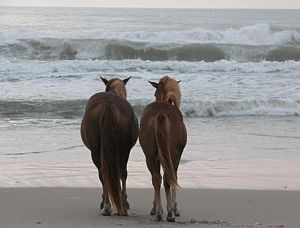
"Yea, running for Speaker of the House." "I think he's got a chance, consdering." "Yea, at least he's more than just a horse's ass."
***************************** Quilcene: Lat. 47.82N Long. 122.88WWord to the wise: If you've never seen it, don't miss the cult classic From Dusk Till Dawn starring Salma Hayek and some other people.
***************************** I just watched two shows on the Science channel, one on the unique creatures of Madagascar, and the other on those of Japan, how they arrived, etcetera. They were both very well done, going through time from millions of years ago, the shifting plates and ocean currents, the land bridges that came and went with the recurring ice ages, explaining how they might have travelled to their present locations and how the changing climate and terrain affected evolution and diversity, two well-packaged documentaries.Two thousand years ago humans showed up on the island/continent of Madagascar. Now, 90& of all the forests are gone, and with them many species are gone as well, extinct, due, mostly, to this habitat loss--they starved to death. But that's not what I want to write about, humans recklessly and selfishly eradicating one species after another is such a common worldwide occurrence that it seems hopeless to even talk about it. What I do want to bring up is the narrative, especially with regard to the Macaque monkeys of Japan. It seems like an intractable, indelible, ingrained dogma to declare that whenever a human does something new, something previously unknown to not only him but to the species as a whole, it's considered learning. But when, say, a Macaque monkey or one of the many species of lemurs in Madagascar does the same thing, it's called evolution. The macaques of Japan, the snow-bound ones, discovered a hot springs enabling them to survive more or less comfortably through the harsh winter. Did one of them one day accidentally fall into it, immediatley altering her genome? Did she then pass the gene for falling-into-the-hot-spring down to her children, and through observation the others of her tribe followed suit? No! Somebody found it, felt the heat, jumped in and said in monkey talk, "Wow, this is really neat," and told the others. She learned something that she knew to be vitally important, as it turned out; she understood the significance. Why do we refuse to give other animals, especially other primates, the credit of being able to learn stuff? I learned calculus and how to fish on the ocean, I didn't evolve in those directions. The gene for understanding calculus didn't accidentally emerge in my chromosomes; I didn't wake up one day to find myself on the deck of a boat; although, some days it felt like it. It just ticks me off, the arrogance of our species. Maybe eventually we'll evolve enough to understand what goes on inside the brains of other creatures, how they perceive, their consciousness. Could very well be that they're dealing in and on a dimension of time and space that we simply are not privy to. Similar to the parallel universe idea that gravity is strong on some other membrane. And let's not even get started on the genius of the plant world. And the worlds of microorganisms?
*****************************
***************************** Science Report - May 13, 2013Doctor Frederick Solvenstein's new book, The Evolution of Man's Destiny (Simon & Shuster), is the talk of not only academic circles, but also the broader world of the cognoscenti. A professor of evolutionary developmental biology at the John D. Oppenheimer Institute for Advanced Studies, he's spent years researching the behavior of mankind around the world. As is his custom, instead of trying to force raw data into historically preexisting grooves of thought, he approached the study without benefit of a presupposed hypothesis, allowing unbiased evidence and pure reason to lead the way. His conclusion, based on extensive statistical analysis and interviews with select individuals, from leading scientists, artists, and teachers to builders, mountain farmers, and menial laborers of every sort, is difficult to refute. Because of his almost supernatural objectivity--underlying his perception of novel patterns and unexpected trends--he anticipates emergent behavior from disconnected phenomena and is unafraid to acknowledge it. To say he thinks outside the box would be an understatement. As a result, his prediction for the course of future humanity, though undeniably painful and incredulous even to comprehend, is nonetheless accepted by the scientific community as though written in stone. He explains: Current evidence puts the bifurcation from chimpanzees of pre-humans at five to seven million years ago, and human beings, as Homo sapiens, began in their modern form 200,000 or so years ago. Then, there was no recognition, or rather, speculation that mankind was separate and apart from nature, that humans were in a class all by themselves and, accordingly, all other living things were subservient to human needs and desires. Religions came along and reinforced this notion. Consequently, substantiated by flashes of insights, people gradually began to isolate themselves from the rest of nature, perceiveing it with an adversarial attitude as something hostile and threatening, needing to be subdued, conquered. Over tens of thousands of years, this originally intellectual or mental disposition affected the human genome through adaption and feedback. Very few people at present, almost exclusively tribes far removed from civilization, identify with and feel as one with the natural order. We have taken over the process of evolution, he states, and so are responsible for our own undoing. Our resistance to cooperation has altered our genetic makeup, genes established originally to support cooperative effort, to reinforce synthesizing bonds have atrophied and fallen fallow, no longer passed on as was the case when mankind was relatively new. Humanity, he concludes, is weaning itself away from the capacity for empathy and compassion. Individuals are becoming more and more isolated, exponentially, from a genetic standpoint, with each successive generation. This direction will inevitably lead to the ultimate breakdown and disintegration of the family, the fundamental unit of society, as well as the fragmentation of all other forms of communal and natural world cohesion. Chaos will ensue, dissolution, entropy, mankind will finally have destroyed the living planet--a process that's been going on for millennia--and, as a result, man will most certainly self-destruct, implode. For a time, anarchy will reign, but then, that too will pass, lose its impetus, whither and turn to stone. As we as a species evolve, paths present themselves, unbeknown to us, on an unconscious level; we venture down one or the other as though pulled along, but we can also make choices based on an understanding of how things work and what is going on. However, we humans are not exempt from the laws of nature, special and held apart, some paths are irrevocably dead-ends. It's only a matter of time, he states. The path is set and nothing can be done about it. Only a tiny fraction will survive the coming disentanglement, as Doctor Solvenstein phrases it. And, according to him, there's no way to know who they will be.
***************************** June, 2013I woke up the other morning and because of a dream I'd been having, a question hung in my foggy brain: How fast does the sun travel through the galaxy? I had no idea. It's weird, our minds are filled with lots of facts, especially about things we're interested in. So, being an interested student of astronomy, how come I didn't know that? I found out. Depending on the estimate, at best, of the number of years it takes for the sun to make one journey, a single revolution around the Milky Way, the speed at which our sun forges ahead into traffic will vary, obviously; also, we can never repeat the same magnetic and gravitational path. I've read everything from 225 million to 250 million years for one orbit. And we're approximately 26,000 light years [one light year equals 6 trillion miles] from the center. The orbit is circular, so, let's do the math. The radius in number of miles is 6 trillion times 26,000. Circumference equals two-pi times the radius. That huge number divided by 250 million years gives us miles per year. How many hours in a year? Twenty-four times 365 days. So, divde that number into the number of miles and the average circumnavigation speed comes to 486,000 miles per hour. That's really fast. And yet, for millennia upon millennia we humans have seen pretty much the same night sky, the same arrangemnt of constellations. So to be traveling that fast and yet not really notice any headway, it just struck me, for the first time, just how gigantically vast, not the universe, but our galaxy is. Full Moon at perigee tonight--June 22. Not often that combination. It's 30% larger looking, especially on the horizon.
***************************** This is a story about the difference between and and 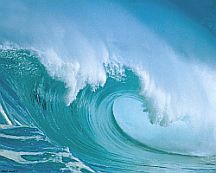 . .
"The length of the curve between any two points on the Koch Snowflake is infinite. No small piece of it is line-like, but rather is composed of an infinite number of segments joined at different angles." [Wikipedia] I wrote a short story, science fiction, in which I described a black hole as a geometric space composed entirely of right angles, no straight line-segments anywhere, and increasing by scale in subdivisions until the singularity is reached. At that point, it is no longer possible for anything to be smaller, the procedure is complete. The pores of spacetime reveal themselves, and what lies underneath, besides being of a non-geometric nature, impinges on and gives existence to the entire multiverse.
The Koch Snowflake (Koch Curve) is an example of what's called an exact fractal--identical at all scales. Each subsequent iteration is exactly the same as its parent. But in the Julia and Mandelbroit sets, variation of the similarity happens over generations. This is a class of open-ended fractal development. This brought to mind a documentary I saw once on evolution. People were asked to trace over a straight line on a blackboard. Each person drew it slightly off until--using two boards--the resulting wiggly lines differed dramatically. This was by way of emphasizing the role of mutation at each bifurcation--each generation--without which natural selection would have nothing to work on. So, does evolution proceed along an open-ended fractal path? What place determinism? Have we neglected to consider the nonlinearity? Without the possibility of an unprecedented spontaneous transformation, there can be no life. It seems to need it. If life were a closed-loop system, where each generation was exactly the same, logically, the initial creatures--our forebears--would never have evolved in the first place. You can't have a diversity of creatures spring up simultaneously without ancestral precedent--Darwin 101. There had to be a beginning. The argument is circular, therefore, variation over successive generations, not only with life but with the unverse at large, would seem to be built-in; that is, an element of randomness is required for the cosmos to be, and, as its expression, life. Evolution can shift gears, as with the Cambrian Explosion, but, it can only work with existing materials. Could it be that life, being something of its own, apart from its material representation, was just waiting for the tools to cobble together something unpredictable and unprecedented? A leap of consciousness finding the procedural ingredients and methods available, arranged them in ways previously unthoughtof but, nonetheless, inherent as potential? Did life have a direction? Does it always? It must be asked: epigenetically, what role does the environment have in affecting gene expression, in drawing a species towards what it, the environment, prefers as it undergoes transformation, as though an external observation had been made? As far as the actual biochemical and phylogenic manifestation is concerned, a trigger must set it all in motion. A critical threshold is reached and passed. Life is ready, pushing, prodding, relentlessly. It knows what it wants to do, it only needs the tools. Even if a transition takes millions of years to complete--from simple to complex structure--somehow life had to know in the beginning where it needed to go and how to do it. The original imprint and design, having been laid down at the onset of the Cambrian, proceeded (and continue to do so) along fractal lines. There had to have been that first individual or whole species that wiggled off the inheritance line towards the possibility--an unknown trajectory--of something new and more advantageous. Nature is obsessed with the new while yet preserving procedures that have stood the test of time and proven themselves to be versatile and resilient, processes capable of morphing and rearranging the separable parts into other useful functions and occupations. [Mammalian middle ear evolution can now be interpreted as a series of changes in the developmental program of the pharyngeal arches. "Studies of these mammal-like reptiles showed that the anatomical patterns of the middle ear have gradually transformed the elements from the primary jaw joint to the mammalian middle ear components."] As to the Cambrian Explosion, I recall a line from Jet Li's movie, Kiss of the Dragon: "The best thing to do when you lose your way is to go back to the beginning." Evolution tried a path, testing procedures and methods to accomplish ends in the dissipative energy system. How to make it non-dissipative? It must be open-ended. Take in energy, excrete what can't be used. Create a filter for this, process the material into a form of energy that activates, actionizes, the body to generate cells, tissue, organs that have special functions, but first, create a generating set of rules that initates the organization of all the necessary ingredients and processes that make up this organism, and orchestrate them to act as a whole, integrated, interdependent, having one thing in mind. Maybe that's what happened at the end of the Ediacaran and the beginning of the Cambrian, the Big Bang of Biology. Evolution ran into a dead-end, a brick wall and could see no further development; it went back to the drawing board. It gleaned and salvaged what it had learned, ways of accomplishing this and that, tranforming functions, reshaping structure, as with the middle ear at a much later time. Life knows how to do that. No waste, infinite malleablility, clay and the molding hands of life. And the command language changes accordingly. Somehow, mystery of mysteries, life saw that a fractal arrangement combining a Koch-type identical replication [Mitosis] and an open-ended fractal series, one like the Mandelbroit considered as quasi self-similar, introducing mutations into the genetic network [Meiosis], having as their core self-similarity, was a perfect way to promote the continuation of similar creations (cell, tissue, fiber, membrane) while also allowing for the possibility of change by introducing variation through recombination and mutation to the open-ended genome, and, without that proclivity, part of the body could not migrate to other areas to perform other jobs. It's like the weak force in physics. Changes in morphology and function would not have taken place, new parts specifically designed for the job at hand would have had to have been generated. But Nature, aka, Life, is much more efficient than that. It wanted a certain shape out of certain material to perform a certain duty; that, it knew. It saw the pattern somewhere else, embedded in another part, like a sculptor sees a figure in a block of marble. It knew what that part was doing could be morphed to perform other tasks, like the seal's flipper and a human hand.
*****************************
***************************** HeLayers of identity denial, or should I say, denial of layers of identity, piled up to what he had now become. The card-house construction of his reality didn't so much tumble down at the realization, it rather folded in on itself, encapsulated by an intense desire to end the few remaining years he had left being only who he was meant to be, the good and the bad, and to fearlessly not hold back from the living of it, consequences be damned. It was a determination born of frustration and self-loathing; the bleak loneliness his indiscretions and self-destructive decisions had brought him ate at his heart. Of course, when he'd committed those acts, he didn't see them that way. He would not assert his true feelings and desires, forcefully suppressing them, confused and overwhlemed as to who his true self really was: the capricious, self-centered expression of the ultimate being of the cosmos, or his own personal willful, selfish ego. As it turned out, they were one and the same, in different guises. Through most of his life he had restrained himself, believing it was the most expedient and safest course. Always with ill returns, yet he did not learn, afraid to do otherwise, fearful that to assert would cause collapse of the card-house he had so meticulously erected, that it would end in loss of what he vitally wanted to hold onto. But now what? Had not the real consequences proven themselves to be worse than anything he imagined? If he had acted from the deepest level of his being, if he had stood up for himself and who he loved at all forks in the road, heedless of any doubt, would he now be at least satisfied with himself if not happy and fulfilled? He had needed the support of God Himself in order to feel confident to act, but when that direction, that calling had failed him repeatedly, he abandoned all faith in the idea of a god, an all-knowing supreme being, and in how he believed the ultimate source wanted him to live, based on the principles of nature, on what was intended by the universe itself, as he understood. To do so had necessitated self-denial and suppression, willful and detrimental resistance. As a result, he abandoned all faith in himself as well and became unsure, to put it mildly. And once again found himself yearning for that sense of solidness that comes from certainty, from no longer needing to search for the truth. But it was not to be. He learned: you can't maintain what and who you love, what and who makes life worthwhile, half-heartedly, hoping everything will work out in the face of outside agents trying to undermine everything. He learned: the real enemy is within, and life does not offer any do-overs. Following the path of self-enlightnement led him straight into a brick wall. He learned: there is no path, no self-enlightenment, no god-like perception of reality. To seek such is a waste of a life and can lead only to suffering and despair. He learned: follow your heart, no mattter the consequences. No one escapes death, but, by holding onto self-centered beliefs on which actions are based, a person can miss the most important experiences of life.
***************************** SummerAs I get older and closer to the end, I find wise, sententious expressions and profound, pithy utterances that those who aspire to be perceived as enlightened nod at in solemn grace are no more than petty bullshit and empty meaningless nothings. Aphorisms, maxims, pompous moralizing, pretense to deep understandings, all a bunch of crap. Now, it must be said that the whole collection of such commentary contains within it at various places real truth learned through long suffering and painful mistakes. Nonetheless, for my part, it's how I hear them anymore. Watching a TV show, some character will make what purports to be a wise insight, repeating some ancient saying perhaps, and I feel embarrassed for him and the writer. They go right through me, not catching on anything. Neutrinos without meaning.
*****************************
I lay in my bunk and tried to imagine what it would be like to be the last of a species. The emptiness and loneliness for a social animal like a rhino -- loving mothers, protective fathers. To be completely alone, abandoned by your kind. How could this happen? What is wrong? Where has everyone gone? Am I not to be anymore, no more on this earth, my home? Have I not lived according to the truth of who I am? Will I be missed? Will my going send ripples through the animal world? Will my spirit roam the open plain along with the others? I am the last of my people; we will never be again.
What if you were the last of the human race and aliens were hunting you, to kill you, to eradicate our species? And then it happened: you were surrounded on all sides; it was over, hopeless, no salvation would be forthcoming, no cavalry over the hill. You were about to die, the last of your species, and you knew it. Would you feel an emotion and experience a state of consciousness you'd never known before? Something completely unpredictable and unanticipated, impossible to have imagined? I think so. Too bad the aliens don't care.
*****************************
***************************** The Existential NihilistHe was a broken, shattered force of nature, a discombobulated field of loosely connected molecules purposefully rendering the shape of a human being by sheer will and tenacity. He struggled every day with versions of himself, each fighting for dominance, each percolating up from the depths of his dismal hell. He second-guessed his every move, his encounters with others, what he said, why he said it, what did it reveal about his true self, had he ever known it, had he always been a coward? Followed by regret, wishing he'd said or didn't say this or that or done that, torturing himself. After a time, he could no longer trust what he might do, so he avoided others except when he had to, to buy things, to sit on the beach; he withdrew into a reclusive state of mind and heart. This went on for years, beginning when she'd been killed, that day, that moment he found out, when his world ended, collapsing into a meaningless heap of pain. If only he'd been there, he believed he could've prevented it. He berated and tormented himself over and over, a million times a day, accompanied by anguish and tears; he was caught in the undertow. His one confidant, a woman he'd known over twenty years, tried to convince him to let go, to focus on the present. But it was no use. In fact, matters only got worse. He would feel anxious for no reason, followed by heightened phyical energy, as though his body wanted to go out to experience life once again, the way he used to, the way they used to. Memories of acts of betrayal and abandonment of others would well up spontaneously, causing him to cringe in agony and sadness, tears would fill his eyes and he'd wail his sorrow at what he'd done. Suicidal thoughts plagued him, tormented him, offered to relieve his misery if he but surrender. He found himself in a place he never believed he'd know. Emptiness and loss and self-loathing mingled like strands of soul DNA. One day, he found himself in the garden, a garden that was in ruin from neglect, and stood perfectly still. It was all gone, every pretense, every illusion, every hope. He couldn't help it--he dropped through a hole into another dimension. The world slowed way down, almost coming to a standstill. Barriers rigidly held in place as though the source of life itself dissolved, albeit not all at once. There had been years of conditioning. The physical postures and emotionally-connected attitudes which characterized his imprisonment lagged behind like ghosts haunting him, grooves etched into his psyche. He entered a world that in many ways had passed him by. But he knew that without loss; he assimilated it, that awareness, and transformed it into a sober maturity. In that single act of recognition and acceptance, he stopped trying to be who he wasn't, he let go of his dreamstate, his delusion of control. It was though a weight had been lifted. It wasn't that he stopped caring, it was that he realized there was nothing he could do now about any of the past; his only choice was to eat it, the good with the bad. Those times of self-expression and experience rose up, tottering but real, weak and dusty from their long incarceration, from their determined denial. At once he entered a clear space, clear and still and fearless--no anger, no hatred, no remorse. This gave him strength. The strength that comes from realizing that had he been free at the time of his tragedy, it may not have happened. That state of mind, that relaxed openness to the world coupled with the absence of any need or reason to comply with superficiality brought him back to the present. But not the present he formerly knew, no, this present had the stamp of approval, not from any credo or criterion of faith, not from any dogma or guiding set of principles; on the contrary, their complete dissolution and abandonment was the curtain of OZ pulling aside. The rules, roles, and rituals that had controlled his life, moderated his decisions, channeled his energy disintegrated like a cardhouse in the wind, leaving what was left--him. "I am," he said softly in the midst of his fallow garden. But there was no joy in the saying of it, no euphoria buoyed him. Nonetheless, he felt at peace with himself for the first time in memory. The anger left as though a switch had been flipped. He saw how it had worked against him. How feeling oppressed had worked against him. How deconstructing others had worked against him. He was free, done with windmills. He knew percisely who he was, and no one could tell him any differently.
*****************************
***************************** Have you ever thought about this?Have you ever wondered why it is that deadly spontaneously emergent viruses effect only humans? There is the discovery--finally--that Colony Collapse Disorder killing the bee populations around the world is a viral infection. But, and this is a big but, that virus or bacteria killing them off indirectly threatens us. Bees are our friends without whom we humans would pay the price of limited food choices, never mind flowers. So here's what I think. Considering the Earth as a life-giving creator, a producer of a wide variety of living things, species, it is responsible, in a very caring yet pragmatic way, for the health and well-being of the whole. Maintaining balance while undergoing continuous transformation is the criterion by which Earth performs its mission, its purpose, and its role as mother to us all. Therefore, there being no scientific or medical explanation attempted anywhere in the world for the sudden emergence of dangerous viruses--strings of RNA having no precursors--it is my educated conjecture that the Earth itself is trying to eliminate and eradicate--as it's done many times before--that which is causing ill-health in the community of living things. The Earth produces these biochemical anomalies in order to rid its body of a dangerous infection destined to destroy the entire biosphere if left unchecked. And that infection, in case you didn't know where I was leading, is US--the Human Race. I also believe it's too late to do anything about it.
***************************** Asymptote: a straight line approached by a given curve as one of the variables--or expressions--in the equation of the curve approaches infinity. The operative word here is approach.Perceiving, on any determinable level, has an asymptotic nature. The closer the trajectory of the curve of clear understanding gets to the tangential angle of the asymptote of enlightenment, the closer we get to objective truth--reality. Infinity can be considered as equivalent to the inherent nonlinearity orchestrating the complex web of physical interdependent interactions taking place in space and time, the emergent identity of the universe. On the other side of this coin, however, if we could but also see the nonlinearity as the fundamental source of the universe, as one whole unto itself and as it transformed from moment to moment, we would then be in that state the ancients called enlightened. The main problem with that, however, from a logical point of view, is that we'd have to leave ourselves out, and thus the perception would necessarily be incomplete in a way that would make it meaningless. The eye that cannot see itself -- how can we know this eye? Prajna is defined as direct seeing into the nature or soul of things, thereby transcending perceptual reality. But is this possible? In the West it's loosely translated as or compared to intuition. But I don't believe that captures the gist of it. Intuition is usually defined as knowing something without the recourse to reason, immediate cognition. But is that direct seeing into its nature? I think Prajna goes deeper than intuition insofar as the inner nature we speak of is the bare bones expression of primordial reality. It's knowledge of the cosmic essence in those terms and from that mutual perspective, which is a higher consciousness than the profane or mundane apprehension of a thing's earth-bound identity. Prajna is four-dimensional; intuition is three. Handicapped as they've been and continue to be by Aristotle and the Age of Reason, Western philosophers are constitutionally incapable of coming up with a concept equivalent to that of prajna. They, along with theologians, talk around it, the most they can do. Regardless of the mode of perception, I side with the Chinese poet Basho on this. With all his genius and insight, he did not believe in enlightenment, at least as it was understood in his time, which, we'd like to think, is the same as now. I have my doubts. Everything evolves. Western psychology, Jung and Freud, other schools of thought and theories of the mind and consciousness have been appended to and complement the philosophy of enlightenment. Nonetheless, the asymptote can never be realized, always it remains just out of reach. The distance separating the trajectory that is your life and the asymptote of enlightenment can be rendered inconsequential only by an act of faith. But faith in what? God or gods? No. Some credo or book of dogma, moral rules of behavior, codes of conduct? No. Faith in science? No. Nothing objective. When we read descriptions of the Pure Land or No-Mind of Buddhism or some other religion's description of analogous illuminated states of mind, we use that for a guide, trying to emulate the arrived state. This is a time-honored practice of all religions, specifically laid out as such in Buddhism. But, that path will only take us so far, and the negative impact on our minds and hearts when we fail to live up to these impossible self-regulating standards can take a heavy toll. At the start of this searching we make the assumption that enlightenment is realizable. If we abandon that false assumption--based on nothing more than hope and a touch of arrogance--that is, the idea that we can realize the state of enlightenment and subsequently everything we do is accepted, validated and even encouraged by the Grand Universe itself, or God, Allah, Atman, and so forth, then, in fact, we come closer to the asymptote. It's a paradox, of course. What is unknowable is forever so; to strive to attain it, to see the ineffable in the mind's eye--to realize reality--wanting to feel convinced that our will and the will of God [however you define that term] are one and the same is identifying with the asymptote at every point along the curve. An illusion instigated by the will to power, to fearlessness, to certainty, and to control. Ironically, this self-justified delusion of absolute lucidity leads to self-destruction on a grand scale as narcissism takes hold. All personal relationships lose their depth of meaning, becoming instead merely transitory and self-gratifying experiences, of no significance; not something we need respect as doing so would inhibit our god-sanctioned action. The distance from the curve of your life to the asymptote of enlightenment is infinite in the sense of nonlinearity. Infinity is not a true measure of length, the notion of length subsumes the idea of linearity. The qualitative difference between linearity and nonlinearity consists in a level of dimension. The leap must therefore be one of faith. Huineng stated that the self is realized in the act of action. He didn't say anything about the possibility of seeing life and reality as a god would. He didn't promote godhood. Focusing on the moment without second-guessing--comparing actions to some god-like standard based on a false assumption--frees the mind and heart. When that happens, the curve of your life approaches the asymptote of enlightenment across the chasm separating perception and identity, out into empty space.
*****************************
***************************** August 15, 2013It's what you didn't do but could have to save your life that plagues you in your waning years. If that be the case. On the other hand, not doing something that you could have might be just what saves your life. How can we know in advance? Wisdom. Intelligence. Experience. As a platform on which to stand as point of view not always counted on. Emotion and mental states often take precedence. Subject to the caveat 'all things being equal,' I've found that my best approach to people of all stripes is a kind of friendliness and openness that goes directly into the other person's heart and soul. I'm not advocating a 'love thy neighbor' attitude, just the psychosomatic fact that to close up is a sign of fear and the emotion blocks you from your potential. You subjugate yourself, and you don't want to do that. Putting up walls is not only counter-productive and stupid, it's not anywhere near as effective as far as feeling free and unafraid, able to assert your best. If that be the case. But most importantly, one must have the WILL to save one's life. That's the X factor.
When I was tenser, My chi was denser, Filling every pore and sensor,
But diluted by time and space,
Nothing remains,
If you fail to explain adequately
***************************** I have a theory.First, let's look at something. By evolution's modus operendi, order and disorder are constantly pushing and pulling on one another. Syntropy and entropy working in tandem are the essential opposites without which the cosmos as we know it would have disintegrated shortly after birth. Their inseparable union form a single superforce running and regulating the physical universe, the self-activating engine immersed in and permeating all that is, without which there would be only the empty Void. So, here's my theory. As life becomes more complex and consciousness leaps exponentially at the threshold of evolution's growth rings, sentient beings throughout the universe must contend with greater levels of internal pressure produced by the stresses and strains of order and disorder fighting for dominance. All order or all disorder cannot be. However, it would seem that disorder must at sometime overwhlem and subjugate order. The heat sink at the end of the rainbow called life and our universe, thermodynamically assured. But I don't agree with that logical scientifically supported prediction. It would mean the end of Mind, the end of self-organization, and the end of the universe's fundamental natural identity. If indeed the heat sink does comes to pass, I believe a whole other way of being for life will also come to pass. What that may look like or entail, what its nature may be, who knows? It's just that I can't conceive of the universe dying in the sense of coming to an ultimate and conclusive end. Life is as interwoven into the nature of the universe as is consciousness and they both evolve. And even though the universe has no discernable environment, in the sense we understand, against which to interact and adapt, it's nonetheless evolving too. How can this be? We understand evolution only within the narrow context of localizing separate species or ecosystems and ascertaining how they might have or could have adapted and transformed based on comprehensive and comprehedible instances. But the big picture has a different view, a Janus perspective. These things, living and non-living, we examine as individual occurrences evolve because they exist within the universe, which is the embodiment of evoltution itself. So, in actuality, the only thing that IS evolving is the Universe. And because of its astronomically great lifespan, we have nothing to compare it to. On a graspable duration, we do observe in nature that when something dies, like a tree, it decays into the surrounding ecosytem and fuels it with essential nutrients and chemicals. Could that be what happens to our universe at its end? Could it be that our solitary universe is no more than a single tree in a vast forest of other universes, other ones that can use the nutrients of our disordered remnants to produce order, pattern, and organization? It doesn't make sense, given how systems are constructed, that our universe is disconnected from the others of the conjectured multiverse, bubble universes floating about in a void, never touching one another and thereby incapable of supplying fuel to surrounding verses at the end of their lifetimes. Order and disorder will forever contend and motivate each other. The drive is for order with the will to create it, but without disorder, there would be nothing to arrange. That's what's in the background, on another dimension, out of our reach, on a grander scale than anything anyone can ever imagine--the eternal play of opposites.
***************************** August 27, 2013Using Mind to resonate with a particular chord of consciousness the quantum world of space alone is entered. Herein, all points [locations] are one and the same, analogous to an electron being in multiple positions at the same moment. Each point is both a phase-space and a parallel universe, and each phase-space can be represented as an oriented simplex. Continuing the analogy with the electron, it's known that they occupy well-defined energy levels around the nucleus of an atom simultaneously. Correspondingly, we can consider a simplex as a planar element occupying multiple dimensions simultaneously, differentiated by a scale gauged to the configuration of the base state. Topologically, a simplex is represented by a two-dimensional triangle, the edges are the borders or faces. The length of each side in conjunction with the other two dictates the curvature of the simplex as planar element, and length is in terms of time. A procedure called refinement can further delineate the structure of each cell-simplex down to the Planck scale. Out in empty space, we can think of the triangles as equilateral; hence, flat space. An oriented simplicial complex then would be akin to the picture of the electron wavefunction that embodies all states simultaneously--the Schrodinger equation--differentiated into eigenvalues with respect to energy by the Hamiltonian. This complex is, at base, two-dimensional--the quantum unit of space--and the integration of associated simplices forms a spacial surface with a varying and dynamic curvature. Gravity, thus, at the quantum level "emerges as the result of," or IS, the curvature of each infinitesimal planar element. And the curvature for each quantum element of space is caused by the temporal aspect; relative duration is an inherent property of matter. Time is the independent operator affecting, and possibly even generating, space. Without matter and radiation, there is no time, and without time, there is no space.
***************************** The following dispatch was captured in mid-broadcast, as it were, and translated--appropriately interpreted where necessary--by Doctor Heinrich Korazinski of SETI. Although the sub-space recording has been verified and accepted as genuine by the scientific community, Doctor Korazinski refuses to reveal how he understood the alien language. One can only guess.
Galactic Survey Report: Sector VL9478K: Year of Zordac - 10293 We have been studying a remote and isolated life-giving planet within a system of eight planets and countless planetoids, asteroids, and comets orbiting a medium-sized sun. This fortuitously positioned planet is quite beautiful to behold, consisting of an estimated 70 to 80 percent water, high mountain ranges, and broad forests. The poles are covered by ice. It is extremely volatile due to volcanoes, earthquakes, and tectonic dynamics, and possesses a strong magnetic field providing protection. As well, the global climate is continually undergoing transformation, rejuvenating the biosphere of both flora and fauna. After extensive and detailed analysis of its sentient populations, we offer our findings and conclusions in this report. Several of its species--to be described in appearance and behavior in that section below--are quite intelligent and capable of communicating clearly and thoughtfully to one another. They nurture their offspring effectively, teaching them what they need to know for the continuance of their specific species. Sharing the resources of the planet as it goes through its transformations seems uppermost in their minds. Unfortunately, the equanimity one would expect from this tacitly understood set of relationships is in evidence only on an isolated and limited scale due to one particular species which has exponentially surpassed the others both in complexity and technological innovations. Not only are some select innovations--to be described later--affecting negatively the living conditions of both flora and fauna on the planet, including, most significantly, the other sentients, but would appear to be the likely cause of their own imminent demise--an educated probability in the high ninety percentile. They demonstrate, through their overt behavior, no awareness or understanding of their interdependent relationship with the rest of the biosphere, indicating a crippling incapacity to experience empathy. Simultaneously, they are actively and disproportionately depleting the planet's resources at an alarming rate with no regard for their future well-being or that of their progeny. From what we've been able to garner by monitoring their communications media, they believe, for no practical reasons we can decipher, that future generations will discover technological and biological means to correct for any shortcomings or abcence of necessities formerly found in nature and thereby continue their lineage. Their actions are insular, self-motivated, and short-sighted, conforming in character to those of the apex sentients studied on planet GH4862F referred to in our last report. They are wild, reckless, and unruly, at a stage in their development displaying primitive emotional and perceptual intelligence and instinctive motivations. Ordinarily, based on our studies of other planets dominated by a single primitive species, it would only be a question of time before they matured. However, because of the psychosomatic span separating them from the other sentients who, as we have seen in other cases, would act as an impediment to accelerated growth, we don't see this as very likely. Their evolution seems to have taken a dead-end path at the last fork in the road, some 200,000 of their years ago. We estimate they have little solar time remaining especially as they pose a threat to the rest of their natural world. Because of their incapacity to appreciate their proper place and role--their purpose--in the overall architecture of the living planet that spawned them, and their irrational and incredulously destructive behavior towards other members of their own species, it is our unanimous recommendation that they, the dominant species, not be contacted for membership in the Galactic Core Community (GCC). The planet itself, as we've pointed out, and the other sentients--as well the other life forms of every order--would make a suitable and valued addition; however, because of the overwhelming influence of the apex species, we advise indefinite quarantine of planet JH7325T. Perhaps in a thousand of their years when we return, that particular species will have become extinct--for reasons that can only be speculated on but are suggested by their current morbid preoccupation with and mysterious innate proclivity for self-destruction--and the biosphere on its way to returning to a state of balance. In which case, a favorable assessment may be ascertained and contact approved. Detailed transcripts and representative statistics follow.
*****************************
***************************** DerekDerek didn't understand, not the underlying concepts or the operating principles. It was his first assignment. Although he'd trained on the latest holographic simulator known, it was like driving an air-car, he learned how to drive but as to how it worked he had not a clue. In the holograph, the impressions of living on an asteroid, working with the company's state-of-the-art mineral processing unit, and, most especially, mining ore deep within the belly of the cold dead rock were very realistic. The unit was self-contained, his job with regard to it would be one of monitoring and adjusting, when necessary, internal processes from control boards located at various places along its length. It was rare that any human meddling would be needed, but when dealing with nonlinear systems, particularly one of such volatility, the pressures and temeperatures invited the occasional breakdown or, at least, a hiccup in the continuity. Computers ran the whole thing, watching from within, but even so, no matter how sophisticated a machine was, subtle modifications due to fluctuations across indeterminant scales were sometimes required. His crew consisted of seven other men and one woman cook. Asteroid mining had not been his first choice when a child nor had it become an adult passion. After years of vagabonding around some of the nearer core planets, adventuring, trying his hand at this or that, he kind of fell into it. One night in a strange bar on a wild outpost planet called Vendanna-Four, he'd wound up drinking and playing holographic billiards with a grizzly group of miners on leave. They were a rough lot but friendly. Almost all had families back on Earth, worked hard and sent most of their earnings home. But when they were on their own and responsibilities had been taken care of, it was time to party, and they approached this duty with the same enthusiastic immersion as they did everything else. Derek found himself drawn to their lifestyle. To him they seemed free and alive, far moreso than the stick people working at boring office jobs where he'd been heading when a student and had ordinary aspirations. He thought, what the hell, and got the address of their home office. As it turned out, they were always in need of new recruits and hired him over the sub-space transceiver. Their base was on Rigel-Three, only two lights away as the crow flies, if crows could fly through gamma-ray soaked black space. One month of training, operating the massive and highly technical digger-smelter-refiner-purifier machine, and, according to his instructors, he was ready. However, it had all been on simulators and he received very little class time on the structure and inner workings of its moving parts. It wasn't wormhole generation, but considering his background, it proved complicated enough. He had to smile at his arrogance concerning his attitude towards the miners he met on Vendanna-Four. On the surface they appeared as simple muscle-heads, but now he realized that each of them was disguising a keen and agile intelligence.
The past is not set in stone, the future influences the present by altering the past, flowing goes from past to future and back again.
Our Lady of Victory
*****************************
In the classic movie "The Fifth Element" she was the voice of the Blue Diva
***************************** March, 2014Spring is on the way. It may be my last, I say without sentiment or sympathy. I'm old. I remember when cars had running boards and we kids would sneak up to a car in the neighborhood about to take off and stand on the one on the passenger side, holding onto the handle. I remember when you could smoke on airplanes and in movie theatres. I remember milkmen delivering milk and real cream in glass bottles; you had to shake the bottle before drinking because it separated. I remember when my tiny pet turtle died and I buried him inside a cardboard box in the backyard. I remember standing under the chute when the coal slid down into the bin; once committed, you couldn't leave or you'd be coaled to death. I remember when a bunch of us little kids would sneak onto a trolley, skirting behind adults standing in front of the driver; everyone would laugh; we thought we were so clever. I remember pea-shooters and carpet-guns and skooters made with a wood soda box, a two-by-four and a roller skate. I remember lots of things from my childhood, spending days in Fairmount Park, playing in front of the fireplug on hot summer days, getting sunburn after a day on the beach of New Jersey no matter what I wore for protection.
Theory on the Impossibility of Teleporting Living Things
In Star Trek we're all familiar with how they beam someone from one place to another, usually over vast distances like from a planet's surface to an orbiting ship. More recently I've listened to scientists, physicists, discuss this mode of transfer on television as though it might be possible some time in the not too distant future. I don't believe so and here's why. The reality of living beings is a superposition of all possible combinations of physical states at any given time-slice. Without this nature spontaneity and will, not to mention decisions and change in the course of a moment or development and transformation in that of a life, would simply not be. Adaptation to new and changing circumstances and with that the propensity for novel emergence of function subject to genetic-molecular reorganization would not be the life-sustaining property it is. We don't see this multi-patterned superposition or rather are not aware of it because the very act of looking collapses the wavefunction of what we are, or, in modern terms, decoheres the wave to a single possiblility. All living things do that all the time. If a being were to undergo teleportation as in Star Trek one set of infinitely complex variables would become fixed initially and emerge at the end coordinates, however far away that may be, devoid of life, that is to say--dead and quite probably disintegrated into a mass of protoplasm. We are more than the sum of our parts. Component-wise, we take those parts to be cognitive, psychological and sensory, to be most general. What underlies and holds them together in a dyanmic way is emotion. Our emotional self is fundamental to our being and our existence. During the period of transfer, and time duration does come into play, there would be a state of no emotion, an emptiness, a void where nothing exists, very similar to the quantum jump from one energy level to the next of an electron. The me at the beginning, if the process were somehow successful, would be differnt than the me at the end as though a parallel self in a parallel universe. And after so many of these teleportations we would have passed into so many different universes that we would never be able to ragain our original self, we could never find it or even be sure if we accidentally--infinitely unlikely--did. A simple representation of notes without interpretation is not possible. We cannot step outside ourselves to see our core unadulterated self before transport and then assess the outcome's authenticity. The act of perception (perceptual reality) both solidifies an identity of self by canceling all other possibilities and alters what is observed subjectively, itself dependent on inummerable and uncategorical filtering variables, simultaneously. The teleportation technology--the hypothetical machine performing the event--makes a measurement, at which infinitesimally thin instant we lose our inherent and natural superposed reality and become two-dimensional, a holographic snapshot captured at a moment in time, our last moment.
*****************************
***************************** The way we grow, there's a lot of disconnects. You're at a certain stage and one morning you look out over your table covered with memorabilia with the sun glinting across it through the yellow spring flowers of the bush pressed against the window and you realize that the person you were twenty or thirty years ago is no more. He's lost. Physically, yes, of course, for all time, no matter what you do. You can only dream of those times--remember & recollect. What I mean is that passionate devotion to a way of seeing the world and the people and things in it. That person. Where did you leave him, when? What happened? Was it a sudden single event? Or did it erode over time behind the scenes, uawares?Disconnect. A break in the continuum. The continuum of your life. A freedom you had. You were free and you belonged to the sea, the ocean, the wind and waves and salt spray in your face. You had a comic book collection second to none. And your books, all of your art books. Do you miss them, do you miss those experiences, or is it that way of seeing you had so firmly internalized? Or so you thought. So you thought. Something happened. Something broke your faith and strength of will and caused you to believe you were heading in the wrong direction. Why? Overwhelmed? Too many things at once? Bad times? But what about the disconnect? What was it about those times that stands out the most? Not what you were doing, you did a lot of different things, some more exciting and worthwhile than others. No. You had the blind confidence not to need to ask anyone what you should be doing with your life. You were in charge of your life, and that felt like--what? Largeness. Competence. Fearlessness. Desire to know and experience. Being in the here and now as though it were your home. A rich intensity filled the air around you. A vitality and enthusiasm. But also a profound sense of calm. No need to withdraw and enclose yourself, to protect yourself, in order to avoid confrontation until you could figure out why you're not confronting. The seeing is still there, you saw it by the window, the sunlight caressing the shapes and textures of your life. Perhaps it never left, only adapted to circumstance best it could. Just like you.
*****************************
The sexiest most gorgeous woman ever to appear on television.
***************************** 
***************************** |
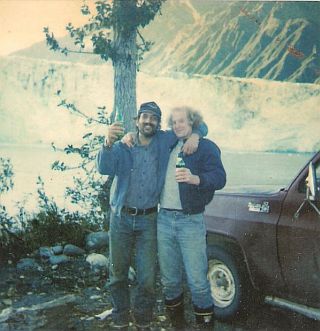
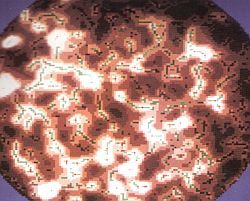 From the depths of the mid-ocean trench that encircles the Earth, molten magma wells up and pushes its way to either side along the ocean floor. New earth is created. And on the other edge, it dives down beneath impinging plates to the furnace again, only to reemerge sometime, somewhere. Now, suppose the Earth was not constrained in size and shape by gravity and magnetic forces? Suppose it was elastic?
From the depths of the mid-ocean trench that encircles the Earth, molten magma wells up and pushes its way to either side along the ocean floor. New earth is created. And on the other edge, it dives down beneath impinging plates to the furnace again, only to reemerge sometime, somewhere. Now, suppose the Earth was not constrained in size and shape by gravity and magnetic forces? Suppose it was elastic?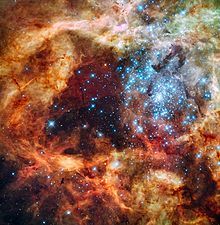 Magnetic fields as large as an entire galaxy, but incomprehensibly weaker than Earth's, weave their way through the cosmos, imposing order and structure out of chaos, compressing molecules of gaseous nebulae into stars. Magnetic fields are so pervasive, they even permeate empty space. So, Empty Space: virtual particles erupting and falling back into the frothing sea, dark energy, magnetic fields, and elasticity--the ability to stretch and expand without limit. Because of this stretchability, space is considered purely topological in nature, euclidean distance that would apply to a rigid body and absolute position of any object embedded in that space have no meaning.
Magnetic fields as large as an entire galaxy, but incomprehensibly weaker than Earth's, weave their way through the cosmos, imposing order and structure out of chaos, compressing molecules of gaseous nebulae into stars. Magnetic fields are so pervasive, they even permeate empty space. So, Empty Space: virtual particles erupting and falling back into the frothing sea, dark energy, magnetic fields, and elasticity--the ability to stretch and expand without limit. Because of this stretchability, space is considered purely topological in nature, euclidean distance that would apply to a rigid body and absolute position of any object embedded in that space have no meaning.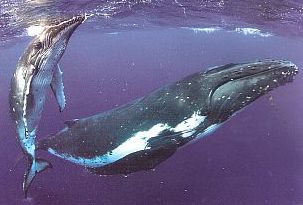
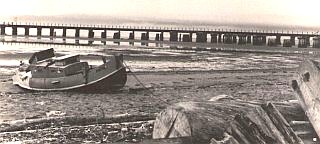 Around dawn he was exhausted and felt defeated, his nerves worn thin. He had no traps and no money to buy any. It had been three days since he'd eaten, all he had was coffee which he drank constantly, it added to his already frazzled temper. He was ready to raise the white flag. That morning, he sat outside in a lawn chair purchased at a thrift store the previous fall. The sun brought solace, comfort, and warmth after a long winter of what seemed like continuous rain and chill. He sat very still, sipping coffee, watching the butterflies, bees, and birds going about their business. They looked purposeful, they had jobs to do and no time to waste. Time was all he had, and he was very good at letting it slip through his fingers. He wanted someone to visit him, but nobody ever did. He was alone with the birds and the butterflies and the mice and the river.
Around dawn he was exhausted and felt defeated, his nerves worn thin. He had no traps and no money to buy any. It had been three days since he'd eaten, all he had was coffee which he drank constantly, it added to his already frazzled temper. He was ready to raise the white flag. That morning, he sat outside in a lawn chair purchased at a thrift store the previous fall. The sun brought solace, comfort, and warmth after a long winter of what seemed like continuous rain and chill. He sat very still, sipping coffee, watching the butterflies, bees, and birds going about their business. They looked purposeful, they had jobs to do and no time to waste. Time was all he had, and he was very good at letting it slip through his fingers. He wanted someone to visit him, but nobody ever did. He was alone with the birds and the butterflies and the mice and the river. He closed his eyes to listen, trying to absorb and infuse his soul with the sense of it. For a moment he forgot himself, letting the strength and determination of the river saturate his dried-up and depleted spirit. Then it passed; he stood detached, separate, and alone.
He closed his eyes to listen, trying to absorb and infuse his soul with the sense of it. For a moment he forgot himself, letting the strength and determination of the river saturate his dried-up and depleted spirit. Then it passed; he stood detached, separate, and alone.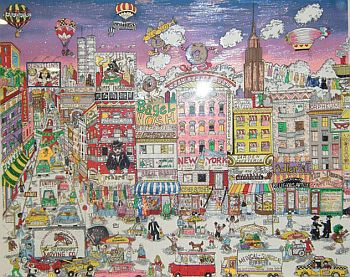
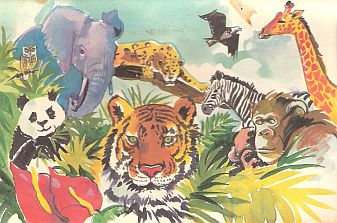
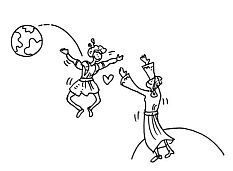 "You don't fall in love like you fall in a hole. You fall like falling through space. Itís like you jump off your own private planet to visit someone elseís planet. And when you get there it all looks different: the flowers, the animals, the colours people wear. It is a big surprise falling in love because you thought you had everything just right on your own planet, and that was true, in a way, but then somebody signalled to you across space and the only way you could visit was to take a giant jump. Away you go, falling into someone elseís orbit and after a while you might decide to pull your two planets together and call it home. And you can bring your dog. Or your cat. Your goldfish, hamster, collection of stones, all your odd socks. (The ones you lost, including the holes, are on the new planet you found.)
"You don't fall in love like you fall in a hole. You fall like falling through space. Itís like you jump off your own private planet to visit someone elseís planet. And when you get there it all looks different: the flowers, the animals, the colours people wear. It is a big surprise falling in love because you thought you had everything just right on your own planet, and that was true, in a way, but then somebody signalled to you across space and the only way you could visit was to take a giant jump. Away you go, falling into someone elseís orbit and after a while you might decide to pull your two planets together and call it home. And you can bring your dog. Or your cat. Your goldfish, hamster, collection of stones, all your odd socks. (The ones you lost, including the holes, are on the new planet you found.)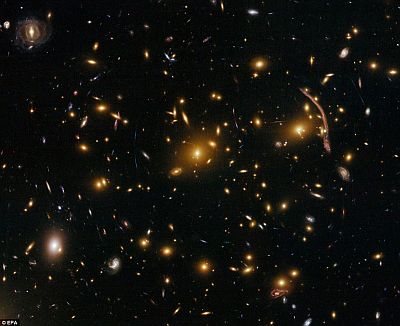
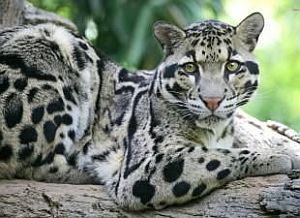

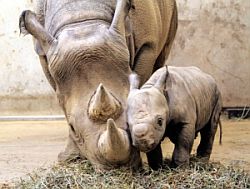 I was not shocked at this news; it was only a matter of time. Poachers have been on a rampage, and the governments don't care.
I was not shocked at this news; it was only a matter of time. Poachers have been on a rampage, and the governments don't care.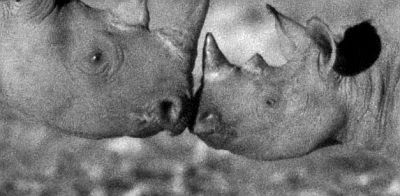


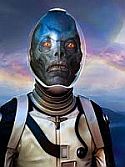 Farther out on the rim, beyond the cluster of planets previously discovered on which sentient life exists--delineated in last period's Survey Report VK9476J--a long-distance scan detected sentience. Deciding that an "outpost" planet might establish a precedent for Core Community expansion, we proceeded to its location. Our report follows:
Farther out on the rim, beyond the cluster of planets previously discovered on which sentient life exists--delineated in last period's Survey Report VK9476J--a long-distance scan detected sentience. Deciding that an "outpost" planet might establish a precedent for Core Community expansion, we proceeded to its location. Our report follows: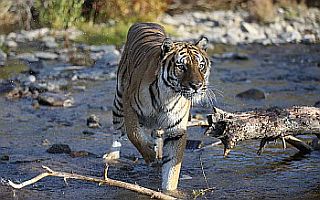
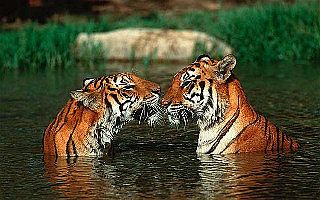
 While traveling to the asteroid named Potato-GH-27, he studied the manual in desperation, trying to understand how its many parts interacted so seamlessly. He wasn't expected to be able to build one, even theoretically, but when it broke down, as mining equipment often did, he wanted to know how to fix it. But he sensed, or rather imagined, that the reason he'd been given such a superficial education on the overall process itself was out of secrecy and not from a lack of qualified instructors. But what could they be hiding and why? All they were doing supposedly was digging Callasium ore, a fairly new mineral not found on Earth or much of anywhere else, for that matter. Its properties were unique and highly classified; its real world application was exclusively under the auspices of the military. He knew of no civilian application, not with building materials or as subtrate for the organic computer industry. But if the latter were the case, he wouldn't know anyway, not being very familiar with the architecture or operating principles.
While traveling to the asteroid named Potato-GH-27, he studied the manual in desperation, trying to understand how its many parts interacted so seamlessly. He wasn't expected to be able to build one, even theoretically, but when it broke down, as mining equipment often did, he wanted to know how to fix it. But he sensed, or rather imagined, that the reason he'd been given such a superficial education on the overall process itself was out of secrecy and not from a lack of qualified instructors. But what could they be hiding and why? All they were doing supposedly was digging Callasium ore, a fairly new mineral not found on Earth or much of anywhere else, for that matter. Its properties were unique and highly classified; its real world application was exclusively under the auspices of the military. He knew of no civilian application, not with building materials or as subtrate for the organic computer industry. But if the latter were the case, he wouldn't know anyway, not being very familiar with the architecture or operating principles.



